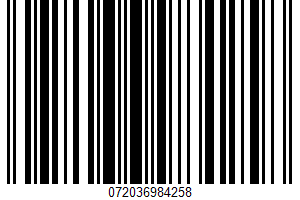Thin Crust Pizza - 320 calories
Manufacturer Harris-teeter Inc.
Product Information and Ingredients
Thin Crust Pizza is manufactured by Harris-teeter Inc. with a suggested serving size of 0.25 PIZZA, PER CONTAINER (145 g) and 320 calories per serving. The nutritional value of a suggested serving of thin crust pizza includes 25 mg of cholesterol, 0 mg of sodium, 37 grams of carbohydrates, 2 grams of dietary fiber, 5 grams of sugar and 15 grams of proteins.
The product's manufacturer code is UPC: 072036984258.
Calories from fat: a total of 33.78% of the calories in the suggested servig of this product come from fat.
Ingredient List
- Crust (wheat Flour
- Water
- Soybean Oil
- Yeast
- Sugar
- Baking Powder [ Sodium Acid Pyrophsophate
- Sodium Bicarbonate
- Cornstarch
- Monocalcium Phosphate]
- Salt
- Soy Lecithin (processing Aid])
- Low Moisture Part-skim Milk Mozzarella Cheese (part-slim Milk
- Cheese Culture
- Salt
- Enzymes)
- Sauce (water
- Tomato Paste
- Salt
- Sugar
- Dextrose
- Spices
- Natural Flavors
- Dehydrated Garlic
- Citric Acid)

Nutrition Facts
Serving Size 0.25 PIZZA, PER CONTAINER (145 g)
| Amount Per Serving | ||
|---|---|---|
| Calories 320 | Calories from Fat 108 | |
| % Daily Value* | ||
| Total Fat 12g | 27% | |
| Saturated Fat 5g | 36% | |
| Trans Fat 0g | ||
| Cholesterol 25mg | 12% | |
| Sodium 0mg | 0% | |
| Total Carbohydrate 37g | 18% | |
| Dietary Fiber 2g | 12% | |
| Sugars 5g | ||
| Protein 15g | ||
| Vitamin A 15% | Vitamin C 22% |
| Calcium 28% | Iron 15% |
* Percent Daily Values are based on a 2,000 calorie diet.
Nutrition Facts
Serving Size 100g (about 3.52 oz)
| Amount Per Serving | ||
|---|---|---|
| Calories 221 | Calories from Fat 75 | |
| % Daily Value* | ||
| Total Fat 8.3g | 18% | |
| Saturated Fat 3.5g | 25% | |
| Trans Fat 0g | ||
| Cholesterol 17mg | 8% | |
| Sodium 462mg | 28% | |
| Total Carbohydrate 25.5g | 12% | |
| Dietary Fiber 1.4g | 8% | |
| Sugars 3g | ||
| Protein 10g | ||
| Vitamin A 10% | Vitamin C 15% |
| Calcium 19% | Iron 10% |
* Percent Daily Values are based on a 2,000 calorie diet.
Thin Crust Pizza Nutritional Value
| Nutrient | Suggested Serving 0.25 PIZZA, PER CONTAINER (145 g) | Standard Serving 100g |
|---|---|---|
| Energy | 320 kcal (23%) | 221 kcal (16%) |
| Protein | 14.99 g (43%) | 10.34 g (29%) |
| Total Lipid (fat) | 12.01 g (27%) | 8.28 g (18%) |
| Carbohydrate, By Difference | 37 g (18%) | 25.52 g (12%) |
| Fiber, Total Dietary | 2 g (12%) | 1.4 g (8%) |
| Sugars, Total | 5 g (29%) | 3.45 g (20%) |
| Calcium, Ca | 249 mg (28%) | 172 mg (19%) |
| Iron, Fe | 1.8 mg (15%) | 1.24 mg (10%) |
| Sodium, Na | 670 mg (40%) | 462 mg (28%) |
| Vitamin C, Total Ascorbic Acid | 9 mg (22%) | 6.2 mg (15%) |
| Vitamin A, Iu | 500 IU (15%) | 345 IU (10%) |
| Fatty Acids, Total Saturated | 5 g (36%) | 3.45 g (25%) |
| Fatty Acids, Total Trans | 0 g (0%) | 0 g (0%) |
| Cholesterol | 25 mg (12%) | 17 mg (8%) |
Calories Burn off Time
How long would it take to burn off Harris-teeter Inc. Thin Crust Pizza with 320 calories? A brisk walk for 70 minutes, jogging for 33 minutes, or hiking for 53 minutes will help your burn off the calories in thin crust pizza.
Burn off time varies based on your weight, physical activity and exercise intensity. The following physical activity table contains an estimated burn off time for a person weighting 154 lbs.
| Physical Activity | Burn Off Time |
|---|---|
| Bicycling - 10 mph or less | 67 minutes |
| Dancing | 58 minutes |
| Golfing | 58 minutes |
| Hiking | 53 minutes |
| Light Gardening | 58 minutes |
| Stretching | 107 minutes |
| Walking - 3.5 mph | 70 minutes |
| Weight Training - light workout | 89 minutes |
| Aerobics | 40 minutes |
| Basketball | 44 minutes |
| Bicycling - 10 mph or more | 33 minutes |
| Running - 5 mph | 33 minutes |
| Swimming | 38 minutes |
| Walking - 4.5 mph | 42 minutes |
| Weight Training - vigorous workout | 44 minutes |
Footnotes
Percent daily values are based on a 2,000 calorie reference diet. Factors like age, gender and level of physical activity may affect your daily required values.
The editorial opinions regarding food value or quality in this website are given without warranty, and are not intended to replace medical advice or a nutritionist guidance.
Dietary Recommendations
A healthy eating pattern that accounts for all foods and beverages within an appropriate calorie level could help achieve and maintain a healthy weight and reduce the risk of chronic disease. Healthy eating habits include the following:
- Vegetables from all subgroups, including dark, green, red and orange vegetables and also beans and peas
- A variety of whole fruits
- Grains with at least half of which are whole grains
- Low or fat free dairy products, including milk, yogurt, cheese and/or fortified soy beverages
- Protein foods, including seafood, lean meats and poultry, eggs and nuts
- Oils with limited amounts of saturated fats and trans fats, added sugars, and sodium
